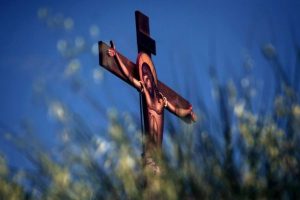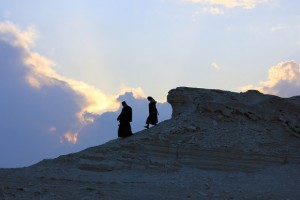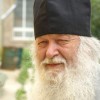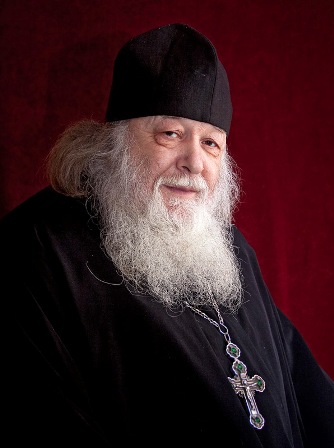 In the Name of the Father, and of the Son, and of the Holy Spirit!
In the Name of the Father, and of the Son, and of the Holy Spirit!
Today, on this Sunday, the Holy Fathers have established the commemoration of the First Ecumenical Council. The Gospel we heard today [John 17:1-13] is always read when the memory of the Fathers of Ecumenical Councils is celebrated.
What kind of institution was the Ecumenical Council?
This institution was bound up with the true faith. In everyday life we very often hear people say things like: “The main thing is to believe in God. But as for what you believe, that’s something everyone can decide for himself.” St. Theophan the Recluse foresaw this phenomenon, this indifference towards the true faith, this kind of selfness that grows into pride and self-conceit, spawning more and more such beliefs. At first there were just small divisions among the faithful, which later grew bigger and bigger. In the end, as St. Theophan predicted, “every head will have its own faith.”
The Holy Fathers, by gathering together from the entire world and from every church where the Gospel was being preached in order to confirm the true faith, testified to the fact that the true faith – that is, what one should believe and understand about God’s essence – is the most important and essential thing.
If we take a sensible look at this truth, then it should make sense to everyone, since it concerns us directly. We are always displeased when people speak untruths about us: “That’s a lie. I’m not like that!” This phenomenon is widespread in daily life. Take various historical figures and famous people –rulers or public figures, representatives of the sciences, arts, or military. Books are written and memoires are published in which it’s claimed that they were different than we had thought. Everyone wants to know the historical truth, what they were actually like as people, how they presented themselves, and what kind of people they were. These questions are always present in history and literature. People try to figure them out – to understand, for example, what Ivan the Terrible or Emperor Paul I were really like. There was a time when one was simply portrayed as an executioner, and the other as being somehow abnormal or even stunted. We certainly know how our last Tsar used to be portrayed. But as time passes, it turns out that many of them were saints and that what was written about them was lies.
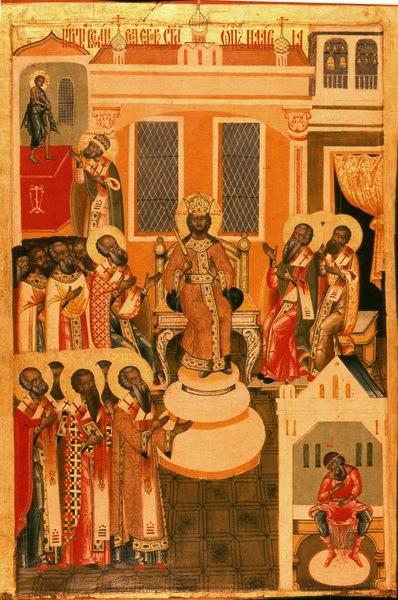 In short, we want to know the truth about everyone. And we think that a correct view should also be held about us.
In short, we want to know the truth about everyone. And we think that a correct view should also be held about us.
As far as we are concerned, however, this is a difficult question, since we want people to speak well of us. Unfortunately, we are not always good, but we want to look as though we were. Here we can say: yes, we want the truth to be told about us – but only on our terms.
This untruth in us stems from the fact that, as the Prophet David said, Every man is a liar (Psalm 115:2). We are sinners, and we don’t want people to know about our sins or for them to talk about us as we really are. Moreover, even at Confession it’s difficult for us to say what we’re really like. Both cunning and self-justification enter the picture. That’s why people, when they talk about themselves, are “far from objective,” as they say. Sinful people cannot have an “objective opinion.” Their opinion is always subjective, because they look at everything from their own one-sided perspective. Generally speaking, none of us can tell the truth about ourselves, because we don’t know the truth about ourselves.
Let’s take something from the Gospel, not as an accusation, but as what might be considered a classical example: the Apostle Peter. He was zealous and really did love the Savior. He said: Though all men shall be offended because of Thee, yet will I never be offended. Jesus said unto him, Verily I say unto thee, That this night, before the cock crow, thou shalt deny Me thrice (Matthew 26:33-34). And this is exactly what happened. So was Peter right or wrong?
He was both right and wrong. He was right in that he indeed stated what he wanted to be true. He later witnessed to this fidelity through his martyric death. But he was wrong in that he himself, being human, could not assess his own strength or the extent to which the enemy would attack him. This explains what happened to him.
Thus, when the question concerns people’s earthly lives, it is important. Therefore we do try, at the very least, to approach things as they really are.
And when the question concerns God, it is supremely important.
Therefore, the true faith is the most important thing towards which we should aspire.
The Lord Himself said: And this is life eternal, that they might know Thee the only true God, and Jesus Christ, Whom Thou hast sent (John 17:3).
The only true God. Therefore the words we hear – “God is one, so all faiths are equally true” – contradict the truth. No, this cannot be. Only the true faith is supremely true. Therefore, the true faith should be at the foundation of our understanding of both the Divinity and of life.
Where does the multiplicity of faiths come from? It’s very simple. It comes about when people aspire not towards the true faith, but to their own ego, to having their own understanding of these questions confirmed – to the point that “every head will have its own faith,” as St. Theophan said. “This is how I understand God, and that’s all that matters.”
Moreover, everyone even interprets the Gospel – that is, the Savior’s recorded words – differently. Hence, the multitude of confessions.
But the true faith nonetheless exists, and should be primary. It was for this reason that the Ecumenical Councils gathered and defined the principles of the true faith. This truth was accepted not by the majority – as is sometimes said – but by all without exception, that is, by the fullness of everyone present. Anyone who did not agree was not numbered among the ranks of the holy hierarchs who signed the acts of the Council. They were already outside the true Church. Only when there was complete unanimity and acceptance was someone considered to be a member of the Church and to confess the true faith.
The Lord says in today’s Gospel: may they be one, as we are (John 17:11). That is, only through complete unity can the true faith be accepted. At its foundation, above all, is God’s testimony, because people accepted the dogmas of faith on the basis of Holy Scripture and the testimony from on high of the grace of the Holy Spirit. Grace testified and confirmed the dogma adopted at this Ecumenical Council.
In particular, when the First Ecumenical Council adopted the dogma of the consubstantiality of Jesus Christ, the Son of God, with the Father, people asked: “Well, how can we understand this?” Everything concerning the Divinity is ultimately unsearchable. The Holy Fathers, due to their spiritually exalted state, were able to comprehend Him to a certain extent, but God in His fullness is unsearchable. As such, the Holy Spirit and the Holy Fathers, in whom the Holy Spirit acts, confirm the dogmas of faith.
The decisions of the Ecumenical Councils began thus: “For it seemed good to the Holy Spirit, and to us” [cf. Acts 15:28]. Then followed the acts of the Ecumenical Council.
The simple St. Spyridon of Trimythous witnessed to this assent of the Holy Spirit at the First Ecumenical Council. When asked how Jesus Christ could be the God-Man, consubstantial with the Father, he took a plinth – that is, a brick – and squeezed it. Simultaneously, water flowed from it and fire broke out – although water and fire are incompatible, with water putting out fire. That is, it was a miraculous testimony.
At subsequent Ecumenical Councils, when the dogma of the hypostasis of the Son of God, Jesus Christ, was adopted, it was written: “Divinity and Humanity are united in Jesus Christ inconfusedly, unchangeably, indivisibly, and inseparably.” That is, Divine-Human, without confusion, change, division, or separation. St. John Chrysostom says about this dogma: “That this is so, I believe; but how it is so, I cannot grasp.”
If we take human reason, what can we say when there are questions regarding creation – not even to mention the Creator – that we cannot answer? Imagine what we are made of: if every minute element of our visible being is made of something else, which in turn is made of something else still, it leads to endless subdivision. What is the primary element? Is it some particle? Then what is that made of? We can delve deeper and deeper into the micro-world, but still not grasp what everything is made of. It’s made of fields, they say. But what is a field? If we mentally delve into space and go further, and further, and further – then what? What is beyond whatever we can reach? Where is the end of space?
If there are certain things in the visible world that we cannot grasp, or even imagine, then what can we say about God’s essence, which is invisible and unsearchable?
On the feast of the Holy Trinity [Pentecost], the kneeling prayers speak of these attributes of the Divinity: He is Invisible, Incomprehensible, Unsearchable, Unchanging. As such, only the Lord Himself, and those to whom the Lord has revealed it, can testify to this truth.
The testimony of the Ecumenical Councils, as I have already mentioned, was presented like this: “For it seemed good to the Holy Spirit, and to us.” The Lord testified to this, as did the servants of God who had apprehended and spoken all this from the Holy Spirit.
Therefore, the truth of faith and the true faith are very important. A careless attitude towards this question simply shows a lack of intelligence and reasoning. For when mundane things are concerned, we tend to be reasonable. But when it comes to God, our minds tend to wander off somewhere.
Take, for instance, people who say: “Come to us.” And so people go to them, because everything there is simple and there is no compulsion. But when you enter Orthodox churches, churches of the true God, then all the magnificence of the church – all its beauty, architecture, icons, and imagery – witnesses to the true faith. This is because the Lord created the world beautifully, and all this beauty is expressed in God’s house, in God’s church. When people say “all of this is unimportant and unnecessary, because the soul is the main thing,” this is a rejection of the Godhead’s essence, because God created everything not only wisely, but also beautifully – it is exceedingly good. Here there is not only practicality, but also beauty.
When we communicate in everyday life, especially when it comes to feelings and affections – not even to mention family life – it’s not enough for us just to have heads, hands, and feet. The head needs to be of an appropriate shape. That is, it seems that an understanding of beauty is not alien to us when it concerns either us or those to whom we pay attention. Never mind that someone just has a torso, arms, and legs – we want to see what they really look like. Moreover, art is concerned with depicting and showing all this. How much revolves around all this! It doesn’t matter that everything is just arranged appropriately: five fingers, a nose, and ears. But what kind of nose is it? It turns out that this isn’t a matter of indifference. So there’s no reason to tell lies. We don’t need to fool others and ourselves by saying: “What difference does it make?” For it really does make a difference.
For example, when the fast comes, you can hear people say: “What difference does it make what you eat?” But if it makes no difference, then what are you worrying about? Just eat whatever is at hand. But it turns out that it does make a difference. Don’t tell lies when you ask this question.
Don’t tell lies when you say: “Does it make any difference what you believe?” What you look like and what people think about you does make a difference to you. Why do you think that you can speak about and treat God in any which way? No, that’s not how it works.
All this testifies to the truth. If this is the case here, then it is also the case everywhere. When it comes to church, people ask: “Why do all this? Why adorn everything?” But when it comes to our own homes, then we pay attention to the wallpaper, to what color it is, and everything else. And what about clothes? Try to find any clothes that are the same. Everyone wants something special. But when it comes to faith, then it makes no difference, any which way is fine. Why is it that, when it comes to us, we care about all these things, but when it comes to the Divinity, then it’s just any which way?
No. The true faith is the most important thing. As one of our philosophers, Ivan Kireevsky said, “A man is his faith.”
If we believe in God, if we say that God is love, then we need first of all to confess the Holy Trinity. This is because love always expresses itself in something, in some activity. Love is the harmony and complete unity of all the Persons of the Holy Trinity. You know our classical “Trinity” by Rublev. If we contemplate this image, we can see that all the Persons of the Holy Trinity are in complete harmony and unity. Each harkens and attends to the Other, and this accord can even be seen in the appearance of Each.
Thus, this unity is the prototype to which all creation should aspire. Every imaginable teaching about the “warring of the species” testifies to man’s fall into sin. This wasn’t the case in the beginning. If everything was exceedingly good, then everything was advantageous, and everything was to the glory of God. But when man violated God’s commandment and sinned, the Lord said to him: Thorns also and thistles shall the earth bring forth to thee (Genesis 3:18). This is when the opposition began. When man began to oppose God, all of nature began to oppose Him as well: both within itself and in man. The first man violated the commandment, which concerned fasting: eat everything except from this tree. This was the easiest kind of fast: just don’t eat from this tree in the middle of Paradise. But man violated this commandment.
Now, the further we go the more certain it becomes that, at the end of human existence, for the same reasons, everyone will be able to eat of only one individual tree and from no others. One tree will cause allergies, another will bring about diathesis, and another will cause some other problem. We have reached the point that, having first violated one commandment, we have now begun to reap the consequences from all sides. In our Orthodox faith, this leads to moments of learning that return us to our original condition: obedience, fulfilling the commandments, abstinence. This kind can come forth by nothing, but by prayer and fasting (Mark 9:29). That is, prayer, fasting, and abstinence are the means that return us to our original condition.
The Holy Fathers of the Ecumenical Councils were the sorts of ascetics who had returned, as much as possible, to this original condition. The Lord made manifest the hidden and secret things of His wisdom to them (Psalm 50:8). This wisdom was expressed at the Ecumenical Councils. We accept by faith that which the Lord revealed to them, which is what we believe and confess in the Symbol of Faith. Therefore the Symbol of Faith is a necessary condition for true faith. What we believe needs to be laid out clearly. This is very important. So when people ask whether all this matters, it follows that it really does.
When you accept this truth, it means that you have to do something about it, that you have to work on yourself. This is what people run away from. They don’t want to work. Therefore, there aren’t any lofty reasons for why there are so many faiths. The reasons are really quite primitive. Over there, you don’t need to fast and you don’t need to stand – you can sit down, which is very convenient, and there are other things that you don’t have to do. Put simply, the more things that are no longer “required,” and the more things that are “allowed,” the sooner people will accept these faiths that were invented by fallen spirits. It is said: the kingdom of heaven suffereth violence, and the violent take it by force (Matthew 11:12). That is, one has to work. This work has always been present in our Orthodox faith – above all work on one’s own soul – for which reason it is the main ascetic struggle.
Let us all strive to work on our souls. Let us strive to preserve the purity of the Orthodox faith and not to give in to any heretical temptations. Everything that is not of the Orthodox Church should be alien to us. Sure, there are things here and there that aren’t so different, but the whole fullness of faith is only in Orthodoxy.
People say: “The main thing is this, and these other things are secondary…” Yes, the head and torso are the most important things. Arms are secondary, and people can survive without them – even without either of them. People can also survive without legs, or without fingers. But I think that no one would voluntarily want to have his arms and legs cut off. No one would say: I don’t need them. No normal person would do this.
Take fasting or strict abstinence. No one will force you to do this, but with God’s help we can all fast together. In fact, if you don’t fast, then what joy is there in breaking the fast? But we can experience this joy, this common joy, and have a real feast. When you stand in church, you appreciate it when you can sit down – and if you can lie down, all the better. You begin to appreciate all this. And this isn’t even to mention many other joys.
Therefore, let us give thanks to God that the Lord has revealed to us and established the fullness of the true faith through the Holy Fathers. Let us aspire towards this fullness. As for what we can’t do, may the Lord forgive us sinners. And as for those who are unable, may the Lord help and heal them. Amen.
Delivered on the Sunday of the Holy Fathers, May 27, 2001.
Translated from the Russian












